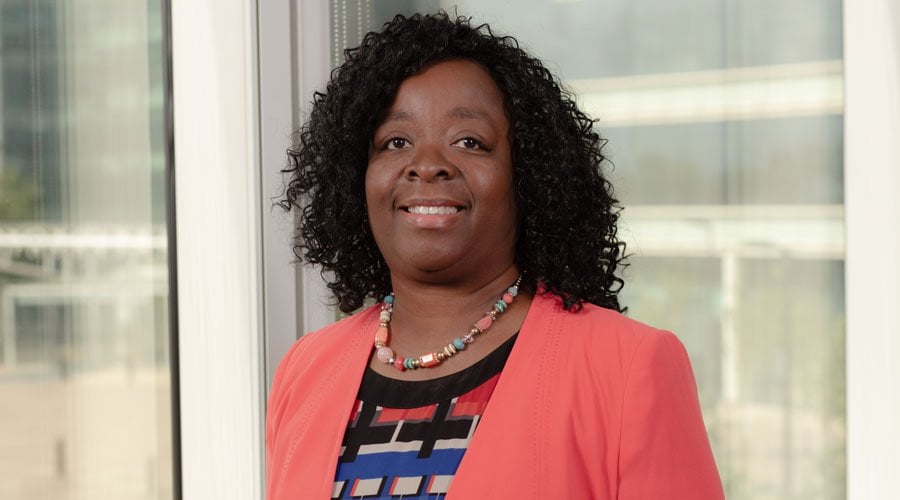Alumni Profile: Juliet Addo
19 January 2023 London School of Hygiene & Tropical Medicine London School of Hygiene & Tropical Medicine https://lshtm.ac.uk/themes/custom/lshtm/images/lshtm-logo-black.png
Current job title and organisation
Global Health Academic Engagement Director and Head of Africa Open Lab, GSK.
Can you please tell us a bit about your current work/research?
In my current role at GSK, I’m responsible for building and maintaining partnerships with researchers and academic/research institutions. I work to identify areas where we can share GSK’s expertise and resources, focusing on three different areas:
- Supporting research into infectious diseases that disproportionately affect low and lower-middle income countries (LLMICs)
- Capability strengthening activities in sub-Saharan Africa
- Providing support for the professional development of early career African scientists.
One of the initiatives I lead is called the GSK Africa Open Lab. This initiative supports African early career scientists doing research into infectious diseases which disproportionately affect sub-Saharan populations and to accelerate progress in getting ahead of this major global health challenge. Through the Africa Open Lab, early career scientists receive mentoring, scientific and technical support alongside funding while they conduct their research. Our current call for proposals is open until 17 February with up to £75,000 available per award – full details can be found on the GSK Africa Open Lab.
I also oversee the GSK Scholarships for Future Health Leaders at LSHTM. This initiative offers three MSc scholarships annually to support the training and development of the next generation of leaders in global health with the aim of strengthening the capacity of health systems and health-related research in Africa. Applications for 2023-24 are open until 1 March. Take a look at the link to see if you or people you know are eligible!
I hope that through my work on these initiatives, the next generation of African scientists will be well equipped to take on Africa’s health challenges and that we will be a step closer to bridging the research gap between Africa and the rest of the world.
What course and year did you study at LSHTM?
PhD in Epidemiology (2004-2008).
Why did you choose to study with LSHTM?
There was no question about which institution to apply to when I decided to pursue a PhD in Epidemiology. The LSHTM has an excellent reputation, and I was fortunate to have mentors who were alumni and who highly recommended the school. They all spoke of the great experience they had whilst studying in the LSHTM and the many doors it had opened to them after their studies.
Did you have to overcome any challenges to study with us?
Like many of the other students with families, I had to balance my academic activities with raising a young family – I had 3 children under the age of 4 and was living in a new country.
I was fortunate to have secured a good scholarship, so I did not have to combine my studies with a job. I mostly had excellent childcare arrangements and made sure to maximise my work output during those periods to make up for the times when I had no childcare and had to juggle multiple commitments.
What were your favourite memories from your studies with us?
I have quite a few that stand out to me:
- The dedicated faculty members who were global experts in their disciplines, yet so approachable and supportive of students.
- The rich experience gained from interacting with other students from so many different backgrounds, cultures and with different expertise. There was always someone to reach out to for guidance whether academically or socially.
- I can also never forget the Christmas parties organised for the children of the staff and students. We always looked forward to that fun time.
How has your LSHTM degree helped you in your career?
It gave me a solid foundation in epidemiology, global health and deepened my interest in research. I got my first job as a research fellow soon after and have no doubt the rich experience gained through my PhD project enabled me to secure and succeed in the role. I had the opportunity to subsequently collaborate with other researchers in multi-centre projects that included researchers from the LSHTM. The LSHTM network has definitely opened doors in my career, including in my current role.
What would you like to achieve in future?
My ambition is to be able to support others to achieve their career goals; particularly to be able to support the development of the next generation of African scientists and research leaders poised to make an impact in the health of populations in LMICs.
Do you have any advice for students/recent graduates?
Make the most out of your time at the LSHTM. Take advantage of the extensive resources and the special events available and make the most of networking opportunities. On the social side, do make the most of your time in London, explore the historic sites whenever you can.
Do you have any social handles (Twitter/Facebook Usernames) you would like us to use?
You can find me on LinkedIn.